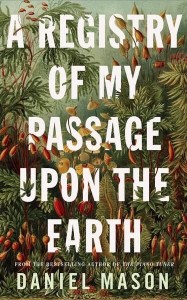
Having found Mason’s novel The Winter Soldier a rich experience, I picked up this collection of short stories. I was surprised to find that I had already read one of them in The Atlantic and thought it brilliant.
“For the Union Dead” begins with the narrator being asked to sort through the belongings of his recently deceased uncle, a nan he didn’t know well. “He was a quiet figure, my father’s only brother, and overshadowed by my mother’s sprawling clan of six siblings.” The narrator does know that Teddy was peculiar: an unmarried man who wore suspenders, drank borscht every morning, and kept the tv tuned to pro wrestling. We learn more about Teddy’s background, his growing interest in Civil War reenactment, and the strange way he chose to participate in it. All add up to an unforgettable portrait of man and the weight of history.
The other stories are about equally peculiar people. Set in earlier ages, each delves into a person who is, well, different. From naturalist Alfred Russel Wallace collecting new species in the Malay Archipelago to a female aéronaute piloting a balloon into eternity, their voices invite us to share their experience as they launch themselves outside society’s straitjacket.
I particularly liked “The Line Agent Pascal” which begins “Every morning Hippolyte Pascal, agent of the Line at Urupá, woke to the sun and the sound of parrots, rose from his hammock, dressed, set a battered kettle on the fire, and crossed his tiny station to check the signal.”
Writers are often advised to leave out routine actions for fear of boring the reader. Yet this first sentence not only grounds the reader in time and place, but also conveys his solitude. It is a time when the telegraph was necessary to connect the town and the distant mines, when the technology was primitive enough to require signal boosters at intervals along the line. But it is his solitude that is the core of the story, the eternal balancing act between solitude and society.
The title story takes us into one of the farthest of society’s outliers: Arthur Bispo de Rosário who calls himself a sailor and “a collector of lives.” What today we would call an outsider artist, he speaks to us from the Brazilian psychiatric institution, his home for fifty years, where a doctor draws details of his life from him. Interspersed in the narrative are Arthur’s descriptions of his elaborate embroideries, part of his “divine mission.“ Mason draws on his own work as a psychiatrist to take us into the mind of this actual person, diagnosed with schizophrenia, whose name now adorns Rio de Janeiro’s Contemporary Art Museum.
The real question in these stories is: What does it feel like to be inside this person’s head? How do they perceive and interpret the world?
And this is the great gift of fiction: to be able to see the world through the eyes of another.
Yes, like many readers, I sometimes dive into a novel to escape from our humdrum or terrifying present into a pleasant dream of a world. Even in the most lightweight novels, though, we are asked to experience the events along with the protagonist. Every time we do that, we increase our capacity for empathy.
Some stories stay with us for years. What is one that has stayed with you?